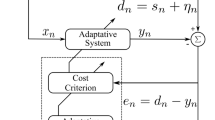Abstract
A complex system is a system composed of many dynamic elements with mutual interactions. This paper proposes a unified approach for the design of an information processing system using a complex system. The method of design is based on the maximum entropy principle. After a detailed explanation, the proposed method is applied to the design of a spatial filter using a complex system.
Similar content being viewed by others
References
Rumelhant DE, Hinton GE, Williams RJ (1986) Learning representations by back-propagation errors. Nature 323:533–536
Poggio T, Torre V, Koch C (1985) Computational vision and regularization theory. Nature 317:314–319
Kohonen T (1988) Self-organization and associative memory. Springer, Berlin, Heidelberg New York
Haken H (1990) Synergetic computers and cognition. Springer, Berlin Hedidelberg New York
Kapun JN, Kesayan HK (1992) Entropy optimization principle with applications. Academic, Boston, San Diego, New York
Tsuchiya K, Nakanishi K (1992) Bayesian estimation of random field with discontinuities. Trans Soc Instrument and Control Engineers 28(4):514–518
Author information
Authors and Affiliations
Corresponding author
About this article
Cite this article
Tsuchiya, K., Tsujita, K. Design of a complex system based on the maximum entropy principle. Artificial Life and Robotics 1, 65–68 (1997). https://doi.org/10.1007/BF02471116
Received:
Accepted:
Issue Date:
DOI: https://doi.org/10.1007/BF02471116




